Considerations for Individuals with Dementia or Alzheimer's
Alzheimer’s disease and other forms of dementia affect millions of people every year. It is a progressive, terminal disease that starts with mental decline (mild memory loss, confusion, inability to problem-solve, etc.), and advances to a point where individuals become unable to speak and walk, and are dependent on others for assistance with eating, dressing, bathing and toileting.
People with advancing dementia lose the ability to make decisions for themselves and their loved ones will need to make medical decisions for them at some point.
How Advance Care Planning Changes for Persons with Dementia
The person with dementia may:
- Not be aware of their condition
- Not understand the disease or how it progresses
- Forget what you discussed or change their mind often; surprise you with new ideas or values
- Tell different people different things
- Become distrustful
- Refuse to talk about their health…let alone dying
- Refuse to sign anything
- Agree with anything anyone tells them
Other Considerations
- Someone will likely have to be part of the support and decision-making process much earlier and much more actively. Possibly to:
- Deal with the pharmacy & oversee medications
- Observe and get treatment for things that the person with dementia had a hard time identifying or denies
- Oversee doctor visits and hospital stays
- Make decisions about what to treat, and how
- Steer the person to get diagnosed in the first place
- Deal with many non-medical issues that come up
Used with permission from Adrienne Doucette & Denise Weeks. Adrienne Doucette is a companion to those with dementia, a hospice volunteer, and a passionate advocate for end-of-life planning. Denise Weeks is a caregiver, a trained advance care planning facilitator, and the author of Mantra: Repetition in the Land of Alzheimer’s.
Helpful Tools for Planning Ahead for Living with Dementia
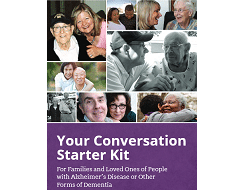 Conversation Starter Kit – Alzheimer’s and Other Forms of Dementia
Conversation Starter Kit – Alzheimer’s and Other Forms of Dementia
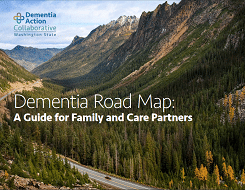 Dementia Road Map – Guide for Family & Care Partners
Dementia Road Map – Guide for Family & Care Partners
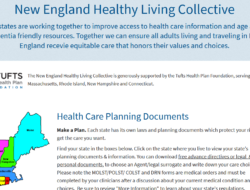 New England Healthy Living Collective
New England Healthy Living Collective
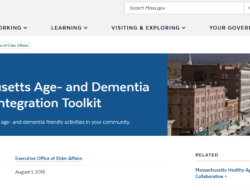 Massachusetts Age- and Dementia Friendly Integration Toolkit
Massachusetts Age- and Dementia Friendly Integration Toolkit
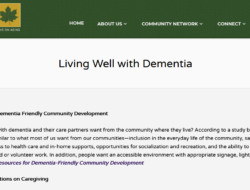 Living Well with Dementia
Living Well with Dementia
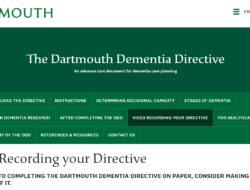 Dartmouth Dementia Directive & Toolkit
Dartmouth Dementia Directive & Toolkit
Vermont does not have a specific dementia directive. Rather, a dementia directive can be integrated into a Vermont Advance Directive to address specific preferences regarding this disease by adding a statement “see attached dementia directive”.
The following forms have been used by people seeking to communicate specific preferences regarding dementia/Alzheimer’s.
Note: See FAQ on adding a personal statement or additional pages to a Vermont Advance Directive.
Planning Ahead for Dying With Dementia – Example Dementia Directive Forms
Dr. Gaster's Dementia Directive (Seen in the NY Times)
For a person seeking to document goals for care at each stage of the disease – mild, moderate and severe – and indicate the level of treatment they would want.
Access FormAdvance Directive Long Form
Enables you to appoint a health care agent, provide detailed instructions about your care, and includes provisions for those with mental health and/or psychiatric considerations.
Download FormEnd of Life Choices – New York: Advance Directive for Receiving Oral Food and Fluids in Dementia
For a person to seeking to document their wishes about when to stop providing assistance with oral feeding and fluids due to advance dementia.
Access FormEnd-of-Life Washington: Instructions for Oral Feeding and Drinking
For a person seeking to document the circumstances under which they would or would not want oral food and fluids to be provided due to dementia or Alzheimer’s.
Access Form Other ToolsThe Dartmouth Dementia Directive
Designed to supplement a standard advance directive to provide guidance to your caregivers about the care you would like to receive should you develop dementia.
Access Form